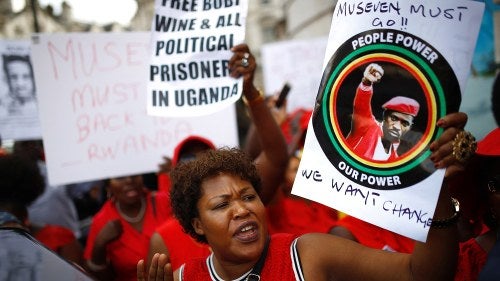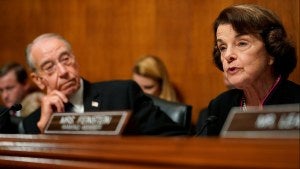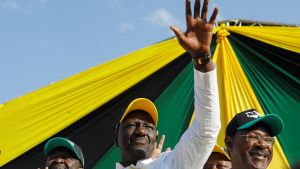Pan-African Attitudes on Gerontocracy

As the youngest continent in the world, Africans want upper age limits for elected officials while still respecting elders.
Muhoozi Kainerugaba, son of Uganda’s President Yoweri Museveni, recently announced his intention to run for the country’s highest office in 2026. Museveni, currently 78, has been in power for 36 years and Kainerugaba seems to be impatient for his chance to take the reins. In tweets that were later deleted, he wrote “The Prime Minister of UK is 42 years old, the Prime Minister of Finland is 37 years. Some of us are hitting 50 years old. We are tired of waiting forever." Kainerugaba himself is 48 and would take office at 51 were he to win the election in 2026.
Kainerugaba is channeling not only the frustrations of other Africans of his age, but also Africans that are much younger than him. Africa is a continent with a relatively young population being represented by older heads of government. More than 60 percent of its population is under 25 and many of its leaders are over 70, but African youths are taking on increasingly active positions in advocacy groups and civil society to make their politics more age-inclusive.
Majorities across Africa Support Age Limits
The eighth round of the Afrobarometer surveys were carried out on various dates ranging from July 2019 to July 2021 to collect opinion data on democracy and governance. These surveys found that majorities in all 34 countries polled believed there should be a maximum age for candidates of heads of government, with the lowest support found in Morocco (58%) and the highest in Mali (95%). Of the countries surveyed, only Benin and Burkina Faso have maximum age limits for their heads of government of 70 and 75 years respectively.
Among some of the eldest African heads of government are Cameroon’s President Paul Biya, currently 85 years old, who has been in office for 40 years and Zimbabwe’s President Emmerson Mnangagwa, currently 80 years old, who has spent 60 of those in politics. The portions of Cameroonians and Zimbabweans that support an upper age limit for their head of government is 72 percent and 78 percent respectively.
Conversations around gerontocracy are having real impacts on contemporary political debate in some African countries. For example, the history of gerontocracy in Nigeria was central to public discourse during its presidential election at the end of February. Nigeria’s incumbent president, Muhammadu Buhari, has reached his two-term limit and recently turned 80 years old. Many Nigerian youth threw their support around Peter Obi, 61, a Labour party member running outside the typical two-party system. Despite Obi’s efforts, President-elect Bola Ahmed Tinubu, 71, of the All Progressives Congress emerged as the victor.
Differing Values of Age and Wisdom
Although pan-African attitudes heavily support upper age limits, most African countries still place a strong emphasis on the value of lived experience. The same Afrobarometer survey found that a majority of Africans (59%) agree or strongly agree that “in order for our country to do well, we should listen more to the wisdom of our elders” while only 27 percent agree or strongly agree that “in order for our country to do well, we should listen more to the wisdom of young people.” Of the 34 countries surveyed, 24 had a majority agree with the first statement, with the highest support in Liberia (85%) and Tanzania (80%). Ugandans and Nigerians likewise heavily support the first statement at 73 and 61 percent respectively.
There were only six countries where a majority recognized the wisdom of young people, with the highest support being in Tunisia (71%), Morocco (67%), and South Africa (57%). Cameroon and Zimbabwe were split almost evenly between the two statements with support for the “wisdom of young people” at 51 and 49 percent respectively.
There appears to be a very strong relationship between support for the wisdom of young people and the median age of the population. Surprisingly, countries with higher median ages tend to support the wisdom of young people over the wisdom of elders. The countries with the highest support for young people—Tunisia (71%), Morocco (67%), and South Africa (57%)—all have histories of progressive political movements. According to the UN Population Projections, the median ages for these countries are among the highest of those surveyed at 32.3, 29.3, and 27.6. Vice versa, some countries with the lowest support for young people, such as Burkina Faso (18%) and Liberia (14%), also have lower median ages of 16 and 18.3 respectively.
One possible explanation for this is that countries with developed infrastructure and social services tend to have a population with an extended life expectancy. In the most recent analysis done by the UNDP, Tunisia (0.731), Morocco (0.683), and South Africa (0.713) were all ranked very high on the Human Development Index (HDI), whereas Burkina Faso (0.449) and Liberia (0.481) are ranked much lower. Tunisia and Morocco also have residual anti-government sentiment stemming from the Arab Spring uprisings, as does South Africa from the anti-Apartheid movement.
By 2030, African youths are projected to make up 42% of the world’s youth population, meaning that we will likely see an uptick in youth political activism within the next few years. The role that African youth have to play in the future of the continent will only continue to grow with the population.


Related Content
 Public Opinion
Public Opinion
While Americans broadly support upper age limits for federal elected officials, age is not their top consideration when choosing a candidate.
 US Foreign Policy
US Foreign Policy
In Africa, “supplying and supporting abusive security forces often directly undermines democracy,” writes Elizabeth Shackelford in the Chicago Tribune.
 Global Politics
Global Politics
Experts Kathleen Klaus and Murithi Mutiga join Deep Dish to discuss the results of Kenya’s presidential election.